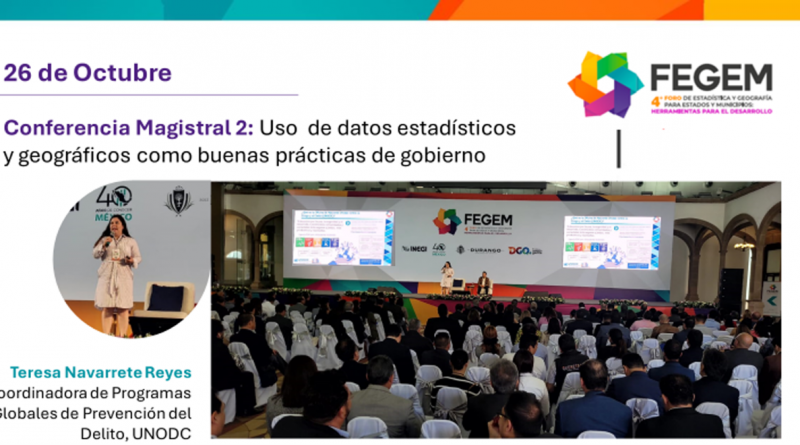During the 4th Statistics and Geography Forum (FEGEM) of INEGI we presented how we adopted and implemented the UNODCity Initiative in Mexico
City of Durango, Durango. UNODC, through the UNODC-INEGI Center of Excellence (CoE), participated in the 4th Forum on Statistics and Geography for States and Municipalities: Tools for Development (FEGEM) organized by the National Institute of Statistics and Geography (INEGI) of Mexico with the Keynote Lecture 2: Use of statistical and geographic data as good government practices.
FEGEM is a space created by INEGI to promote best practices and innovative trends in the use of statistical and geographic information through the development and implementation of tools and information systems to support decision-making and the design of public policies in states and municipalities.
Under this context, UNODC in the framework of the UNODCity Initiative presented the results, experiences and use of information for crime prevention and attention in the municipality of Querétaro, Querétaro and the Mayor’s Office of Iztapalapa, Mexico City. During this presentation, we addressed the methodology of Local Security Audits (ALS) for evidence-based decision making, the understanding of social problems at the highest level of disaggregation, the generation of policies and targeted intervention strategies for crime prevention, as well as the generation of a long-term follow-up and action plan. This methodology and objectives are based on the UNODC Crime Prevention Guidelines.
Likewise, the CoE shared the case study on the analysis of 911 emergency calls with the use of Artificial Intelligence in a selected state of the Mexican Republic. This exercise is a successful example of the use of non-traditional data sources (plain text), with the use of new technologies that can give us accurate information in real time (data timeliness) on the needs of care for women who are suffering violence, to avoid its escalation, including the prevention of a possible femicide. The CoE is looking for new states in Mexico and other countries in Latin America and the Caribbean that wish to replicate this methodology with information from 911 emergency calls.
During the keynote speech, the CoE highlighted the importance of working from the local level to have a regional and global impact, aligned with the achievement of the 2030 Sustainable Development Goals. The actions framed in the UNODCity Initiative through its ALS methodology, contribute to the achievement of Sustainable Development Goals (SDGs) 5: Gender Equality; 16: Peace, Justice and Strong Institutions and 17: Partnerships for the Goals.
The methodology, as well as the Querétaro and Iztapalapa reports are available on the UNODC-INEGI Center of Excellence website: /index.php/auditoria-local-seguridad/. The presentation is also available here.
UNODC is available to collaborate with States and Municipalities in Mexico, and other Latin America and Caribbean countries, that wish to adopt the ALS methodology in the framework of the UNODCity Initiative. For more information, please contact us at unodc-mexico.cde.estadistica@un.org and teresa.navarrete@un.org.



